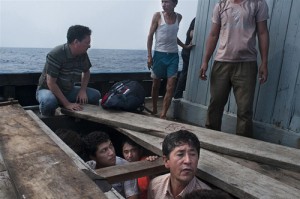Batoor’s journey – award winning photos highlight a people’s plight
 An Afghani Hazara refugee has won the inaugural ‘Photo of the Year’ in the prestigious Nikon-Walkley Press Photography awards.
An Afghani Hazara refugee has won the inaugural ‘Photo of the Year’ in the prestigious Nikon-Walkley Press Photography awards.
Barat Ali Batoor’s photo ‘The First Day at Sea’ was entered as part of a photo essay on asylum seekers travelling the people-smuggling route from Indonesia. It was published in the Global Mail.
Batoor accompanied a group of asylum seekers on a hazardous and ill-fated boat journey from a remote Indonesian island to Christmas Island in September, last year. On the trip the boat started to sink and Batoor and others swam to a nearby island where they were arrested by Indonesian police.
“I’m very excited to have won this award.” Batoor said.
“I’m pleased to have been able to show the real story behind these journeys – to show how people are risking their lives and enduring perils to escape persecution and the threat of death in the home countries.” He said.
“I just tried my best to show what is really happening. My hope is that my pictures will tell that story. This award is not about me, it is about my people and the genocide against them that is getting worse every day.
“These journeys mix fear, boredom and extreme loneliness. They sometimes end happily, sometimes in despair and sometimes in death. I was lucky. I survived and I was quickly found to be a refugee and resettled in Melbourne,” Batoor said.
Batoor, an ethnic Hazara, has been working s as a community guide for AMES in Dandenong since August. Before coming to Australia he worked as a photojournalist in Afghanistan. He produced a series of pictures, published in the Washington Post and Stern Magazine, about ‘The Dancing Boys of Afghanistan’ who were essentially young men kidnapped into sexual slavery by Afghan warlords and tribal leaders.
Because of these photos and his work with the western press, he was forced to flee Afghanistan.
Batoor began documenting the displacement of his own Hazara people in 2005 as they fled from Afghanistan and Pakistan to safety abroad.
The Hazara are a Persian-speaking Shia Muslim minority that is the third-largest ethnic group in Afghanistan.
In September 2012, he became part of the story, fleeing Kabul with his camera in hand. Travelling with 92 other passengers hidden below deck to escape detection by the Water Police, he shot a selection of images capturing the long route through Thailand, Malaysia, Indonesia and by sea to Australia.
“It is a journey of sudden midnight departures, long road trips, surreptitious transactions, treks through jungles, and terror at sea,” Batoor said, of his essay.
“Few people – except for the refugees themselves – ever get to see this reality.”
Batoor’s boat ran aground on the rocks and his camera was ruined but remarkably, his images survived. He was then detained and robbed by Indonesian authorities but escaped. Many of the other people he met on his arduous journey didn’t survive.
“I am very lucky,” he said. “Unlike most Hazaras, I was quickly found to be a refugee. I just kept taking photos; my hope is that, at the very least, these pictures can tell their story.”













